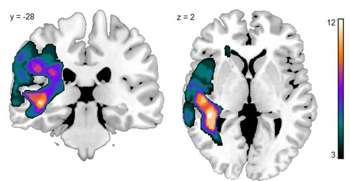New research offers rehabilitation hope for stroke sufferers

(Medical Xpress)—A University of Reading research team has made a huge step forward in understanding in one of the rarest language disorders caused by strokes.
Dr Holly Robson found that the brains of people suffering with Wernicke's aphasia responded significantly more to visual and language tests than those of non-sufferers. In some regions of the brain this increase in blood flow to the brain was over 10 times more in the Wernicke's group than in the control group.
These paradoxical findings could pave the way for new treatments and research avenues in aphasia.
Wernicke's is a rare and devastating type of aphasia - a language disorder impairment caused by stroke which affects an estimated 250,000 people in the UK. Aphasia causes life-changing language problems including the ability to read, take part in conversations and enjoy radio and television. As stroke survival rates increase the number of sufferers is also rising and there is currently no effective treatment for Wernicke's.
This research, which was funded by the Stroke Association and conducted with the University of Manchester and Bangor University, is the biggest ever neuroimaging study of Wernicke's aphasia. The researchers asked 12 individuals with Wernicke's aphasia and 12 age-matched control participants to make conceptual judgments about pictures and words while undergoing functional MRI scanning. The scanning revealed where blood was flowing in the brain and which brain regions were responding during this task.
The results were striking. Although the individuals with Wernicke's aphasia were considerably impaired, the researchers found that their brains were responding more than individuals not affected by stroke. Importantly, many of these increased neural responses were found in the region of the brain which is used for our knowledge of objects, people, words and facts.
Dr Holly Robson, from the University of Reading's Department of Psychology and Clinical Language Sciences and lead author of the study, said: "The results of this study have the potential to turn the tide in the fight against Wernicke's aphasia. Successful treatment for Wernicke's aphasia has proved elusive. There are many types of aphasia which makes these conditions very hard to identify and research so group studies like this are a big step forward.
"The results were not what you might expect. All of our participants with Wernicke's aphasia showed more brain activation than the control group. Intriguingly these changes occurred in brain regions known as the anterior temporal lobes which are thought to support or 'store' conceptual knowledge. So these individuals have comprehension impairments yet they can clearly still access their core conceptual knowledge, in some cases relying more on this core knowledge than people without Wernicke's aphasia. They are taxing their system more to perform the same task.
The researchers know from previous studies that people with Wernicke's aphasia might not be able to use their conceptual knowledge correctly. This poses the question of whether this over activation is helpful or hindering.
Dr Robson concluded: "If we can find out that these changes are beneficial, then we will be able to use new neurostimulation techniques and develop new therapies to encourage and support these brain changes. However, if we find out that this activation is not beneficial, then we will know to take a different approach in therapy. Understanding the way the brain changes after a stroke is crucial for the development of successful rehabilitation techniques."
Dr Madina Kara, Neuroscientist at the Stroke Association, said: "Aphasia is a devastating speech disorder which affects a third of all stroke survivors, and can change a stroke survivor's ability to read, write and speak. This pioneering research, funded by the Stroke Association, is a vital step forward in the understanding of Wernicke's aphasia. These findings will help us develop effective ways to treat patients with this condition, and could help give a voice to stroke survivors living with the speech disorder.
"We are committed to developing a vibrant and diverse stroke research community, and we are delighted that Dr Robson, a Stroke Association-funded Fellow, is leading this novel research."
More information: Holly Robson, Roland Zahn, James L. Keidel, Richard J. Binney, Karen Sage, and Matthew A. Lambon Ralph "The anterior temporal lobes support residual comprehension in Wernicke's aphasia." Brain (2014) 137 (3): 931-943 first published online February 10, 2014 DOI: 10.1093/brain/awt373
















